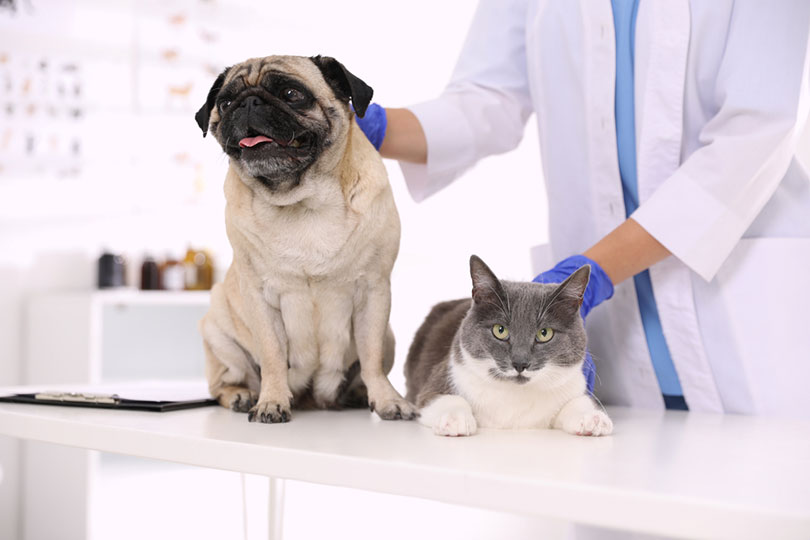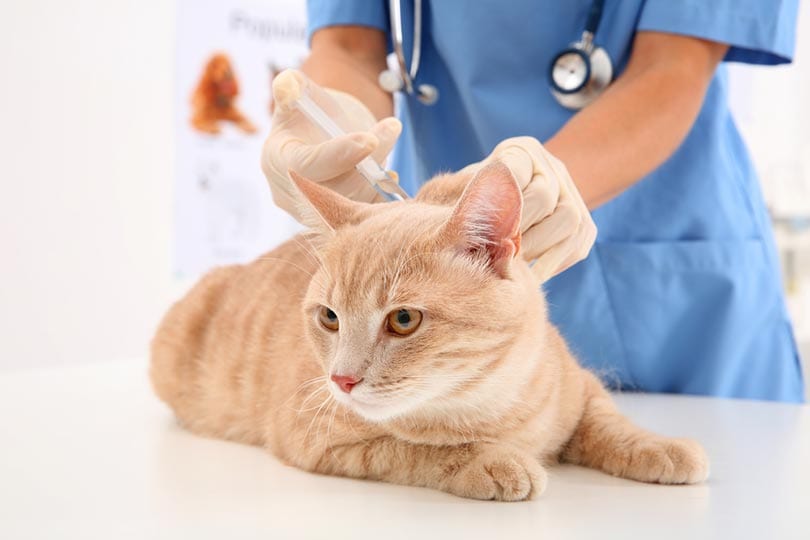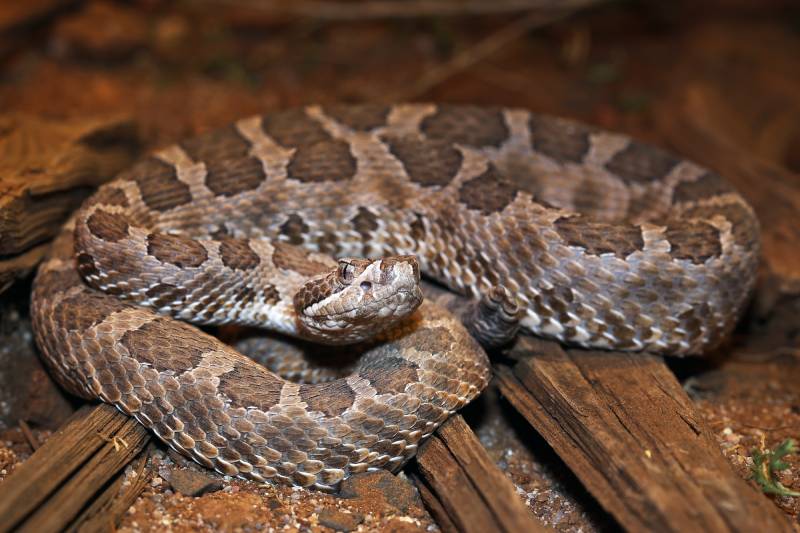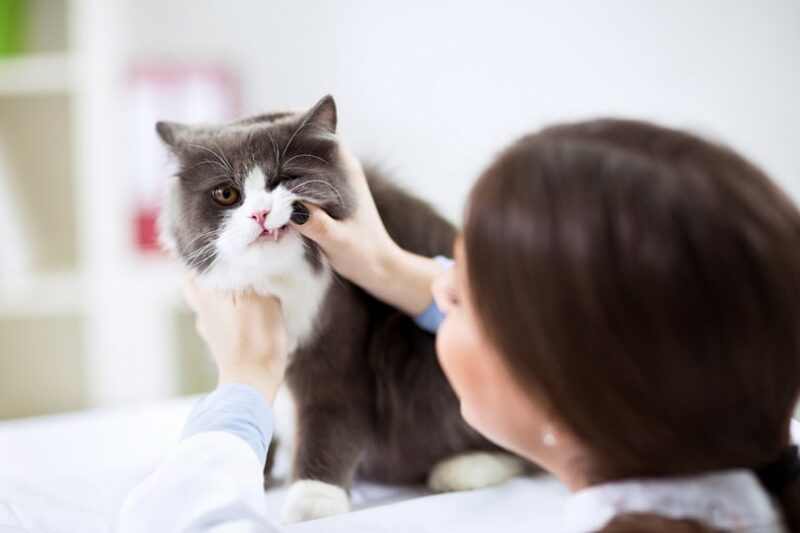VET APPROVED

The information is current and up-to-date in accordance with the latest veterinarian research.
Learn more »Click Below to Skip Ahead
You likely never thought before adopting a cat that they might be allergic to the other pets in the household. Your main concern was probably just hoping for them all to get along!
Although it is rare, your cat can be allergic to other pets, including dogs. But the dog themselves is not the problem that causes the allergy, but rather the proteins found in their skin, saliva, and urine. Perhaps your cat is allergic to something outside that your dog brings in on their paws or fur, such as dust, pollen, or mold. Cats can also be allergic to other cats.

Can My Cat Be Allergic to Dogs?
Cats can be allergic to dogs or other pets, but this type of allergy is not common or well documented. Still, many veterinarians include it in the allergy diagnostic panel (intradermal tests) when cats present allergy signs.
Cats with dog allergies are not allergic to dogs’ hair but rather to the proteins found in their saliva, urine, and skin cells (dander). It is unknown which cat breeds are more prone to dog allergies or which breeds of dogs are more allergenic. However, it is believed that dogs that shed more often are more likely to spread more allergens.
Even though some dog breeds are known to be hypoallergenic, they still spread allergens around, so there is still a (low) chance for your cat to be allergic to hypoallergenic dog breeds.
Another way that your cat can be allergic to dogs is through the allergens that the dog carries on their body (dust, mold, or pollen). For example, if your cat is allergic to pollen, their allergy can be triggered if they come into contact with a dog that has pollen on their fur. Keep in mind that this means your cat is allergic to pollen, not dogs.
Since many diseases have similar clinical signs, it is always recommended to take your cat to the vet for the correct diagnosis.

What Is a Dog Allergy?
Allergies are exaggerated reactions of the immune system, which are triggered when it comes into contact with certain substances in the environment. In the case of dog allergies, a cat’s immune system is triggered when it comes into contact with the proteins in dogs’ skin cells, saliva, and urine.
The immune system of allergy-prone cats treats these substances as foreign, acting against them and triggering an immune response. These foreign substances are called allergens and can reach the body through inhalation, ingestion, or skin contact. Allergies have unpleasant manifestations and can affect your cat’s daily activities.
What Are the Most Common Allergens?
The body does not trigger an immune response to just any substance that it comes into contact with, only to certain ones. The most common substances that cats are allergic to are:
- Pollen
- Dust mites
- Mold
- Food ingredients
- Animal body proteins (from skin, saliva, and urine)
It is improper to say that your cat is allergic to dog hair. Dog hair is just a vector that transports allergens (epithelial cells, saliva, and urine). These proteins are deposited on carpets, furniture, and clothes and can also linger in the air for a long time and be transported to other places, especially through clothes. Basically, they are everywhere.

What Are the Signs of a Dog Allergy?
If your cat is allergic to dogs, they will show the same signs as having any other allergy. The most common clinical signs are:
- Sneezing
- Runny nose
- Head shaking
- Itching
- Intense scratching
- Hair loss
- Tearing and redness of the eyes
- Cough (sometimes)
- In severe cases, breathing difficulties and anaphylactic shock
Itching is one of the most common signs of pet allergies. It can be localized or generalized. If your cat is allergic to something, you will often see them scratching and frequently grooming their limbs, face, and ears. Excessive scratching and grooming can lead to swollen skin and hair loss. This constant trauma to the skin will lead to open wounds, which can become infected.
A visit or call to the vet can provide you with useful information, including appropriate treatment.
How to Determine If Your Cat Is Allergic to Dogs
If your cat is allergic to dogs, the clinical signs are quite visible. You will often see your pet scratching themselves, sometimes to the point of self-mutilation. This can lead to secondary skin infections, hair loss, and in some cases, bad skin odor. You may also notice red eyes and a runny nose.
Your cat is likely allergic to dogs if your pet only shows these clinical signs when coming into contact with them.
That said, it is difficult to assume that your cat has an allergy to dogs if nothing has changed in their environment, and the allergy occurred suddenly. Only intradermal or blood tests can accurately tell if your cat is allergic to dogs or something else. For this reason, it is recommended to take your cat to the vet when you see these signs.
How to Keep Your Allergic Cat Healthy and Happy
Allergies cannot be prevented in the same way that certain diseases can. But symptomatic treatment and increasing tolerance to allergens through vaccination (allergy vaccine) can help your cat lead a happy life.
The allergy vaccine is effective in approximately 70% of cases and can reduce or eliminate the need for symptomatic treatment. Also, limiting your cat’s exposure to dogs will have an effect on reducing the onset of the allergy.
If your cat is allergic to your dog, you can brush and bathe your dog often to keep the allergens to a minimum. Supplementing your cat’s diet with omega-3 fatty acids would also benefit their skin, coat, and immune system.


Conclusion
Cats can be allergic to dogs, but this happens rarely compared to other types of allergies. If you suspect that your cat is allergic to dogs and you notice them scratching themselves more than usual, grooming excessively, having red eyes, sneezing, and having a runny nose, schedule an appointment with the veterinarian.
Unfortunately, allergies cannot be prevented, but they can be kept under control. Your vet can perform specific tests and administer an allergy vaccine.
- Related Read: Can Cats Be Allergic to Litter? (Vet Answer)
Featured Image Credit: Chendongshan, Shutterstock












